| Early Memory Slips May Indicate Alzheimer’s Risk
 Healthy older individuals experiencing memory lapses are significantly more likely to develop dementia, according to new research. In a study of more than 500 seniors, researchers found those with self-reported memory complaints (SMCs) were nearly three times as likely to develop mild cognitive impairment. Additionally, of those who developed dementia, nearly 80 percent had earlier reported SMCs. Healthy older individuals experiencing memory lapses are significantly more likely to develop dementia, according to new research. In a study of more than 500 seniors, researchers found those with self-reported memory complaints (SMCs) were nearly three times as likely to develop mild cognitive impairment. Additionally, of those who developed dementia, nearly 80 percent had earlier reported SMCs.
The study followed participants for an average of 10 years and asked them annually about noticeable changes in memory. Over half of participants reported memory complaints during this time and, on average, progression from SMCs to mild cognitive impairment took nine years while progression to dementia took twelve years. The authors concluded that with this potential early indicator of future dementia, “physicians should query and monitor SMCs from their older patients.”
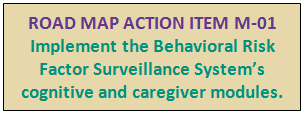
Growing evidence linking self-reported cognitive decline to future dementia underscores the need for public health officials to have a better understanding of the extent of the problem in their states. An Optional Module for the Behavioral Risk Factor Surveillance System (BFRSS) allows states to measure the percentage of the population with self-reported increased confusion or memory loss – those at potentially higher risk of developing dementia and creating a burden on the health care system. Through the Healthy Aging Program at the Centers for Disease Control and Prevention (CDC), the Alzheimer’s Association has funding available to help pay for using the Cognitive Module in your state. For more information, contact Alison Sinton (asinton@alz.org).
Subjective Memory Complaints Study Also Finds Increased Risk Due to Smoking
 Researchers in the SMC study also found that smokers experienced a quicker transition from self-reported memory difficulties to mild cognitive impairment compared with their non-smoking peers. This adds to a growing body of research linking tobacco use to dementia. For a review of the evidence, see the recent WHO brief. Researchers in the SMC study also found that smokers experienced a quicker transition from self-reported memory difficulties to mild cognitive impairment compared with their non-smoking peers. This adds to a growing body of research linking tobacco use to dementia. For a review of the evidence, see the recent WHO brief.
With increasing recognition of the association between smoking and risk of developing dementia, public health officials should begin incorporating brain health messaging into existing anti-smoking campaigns.
Scientists Develop Telltale Alzheimer’s Cells in Laboratory
 For the
first time, scientists have successfully engineered brain cells that
develop plaques and tangles – hallmark indicators of Alzheimer’s disease. These
laboratory-grown cells may help accelerate pre-clinical trials and potentially
lead to novel drug treatments for Alzheimer’s. This work gives researchers
a more accurate testing ground for innovative therapies and may lead to new
discoveries in treatment and prevention. Better testing in early stages may
lead to higher quality drugs and increase the chances for success in future
human trials. For the
first time, scientists have successfully engineered brain cells that
develop plaques and tangles – hallmark indicators of Alzheimer’s disease. These
laboratory-grown cells may help accelerate pre-clinical trials and potentially
lead to novel drug treatments for Alzheimer’s. This work gives researchers
a more accurate testing ground for innovative therapies and may lead to new
discoveries in treatment and prevention. Better testing in early stages may
lead to higher quality drugs and increase the chances for success in future
human trials.
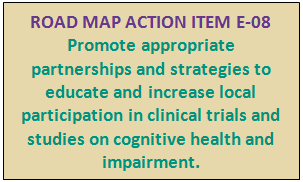 While this is an exciting step
forward for Alzheimer’s science, much more research is necessary to find a way
to cure, slow, or prevent the disease. One important key to success is increasing
participation in Alzheimer’s clinical trials. Public
health officials can promote clinical trial participation and help recruit more individuals into
research. While this is an exciting step
forward for Alzheimer’s science, much more research is necessary to find a way
to cure, slow, or prevent the disease. One important key to success is increasing
participation in Alzheimer’s clinical trials. Public
health officials can promote clinical trial participation and help recruit more individuals into
research.
Alzheimer’s Disease and Dementia
Included at APHA Conference
 Are you
attending the American Public Health Association’s (APHA) 142nd Annual Meeting
& Exposition? Registration is still open.
While there, be sure to stop by the Alzheimer’s Association booth (#1320) at
the Public Health Expo.
Learn about the burden of cognitive decline in your state, the Healthy Brain
Initiative, and why Alzheimer’s is one of the fastest growing public health
crises. Are you
attending the American Public Health Association’s (APHA) 142nd Annual Meeting
& Exposition? Registration is still open.
While there, be sure to stop by the Alzheimer’s Association booth (#1320) at
the Public Health Expo.
Learn about the burden of cognitive decline in your state, the Healthy Brain
Initiative, and why Alzheimer’s is one of the fastest growing public health
crises.
Also, check out these
presentations and posters on Alzheimer’s disease and dementia:
- Monday, November
17, 10:30-12:00 - an oral session on Alzheimer’s Disease and
Dementia covering an array of topics, including addressing
stigma and early diagnosis. Matthew Baumgart, Senior Director of Public
Policy for the Alzheimer’s Association, will also provide a progress
report on the first year of implementation of the Public Health Road Map.
- Tuesday,
November 18, 2:30-3:30 – nine posters will
offer insights into opportunities to integrate cognitive health and
decline into diverse public health programs. Discover ways to raise Alzheimer’s
awareness in minority populations, use BRFSS cognitive health data,
prepare professionals for responding to dementia in their communities, and
assess dementia capacity in local public health departments.
GSA Presentation: New
Directions on Dementia Diagnosis and Treatment
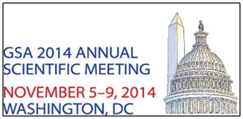 Healthy People 2020 includes an objective
to reduce the proportion of preventable hospitalizations among those with
Alzheimer’s disease and other dementias. Dr. Lynda Anderson, Director of
the Healthy Aging Program at the CDC, will present
a new paper on this issue next week at the 2014 Annual Scientific Meeting of
the Gerontological Society of America (GSA) in
Washington, DC. Healthy People 2020 includes an objective
to reduce the proportion of preventable hospitalizations among those with
Alzheimer’s disease and other dementias. Dr. Lynda Anderson, Director of
the Healthy Aging Program at the CDC, will present
a new paper on this issue next week at the 2014 Annual Scientific Meeting of
the Gerontological Society of America (GSA) in
Washington, DC.
Four other investigators
will also present new research on dementia detection and intervention. The
specific topics are rural outreach for veterans, depression and cognitive
impairment, the role social involvement plays in dementia progression, and a
review of literature on dementia and driving.
Register for the
GSA Annual Scientific Meeting and be sure to catch this session on Wednesday,
November 5, 2014, from 2:30-4:00.
Perspective on Road Map Published
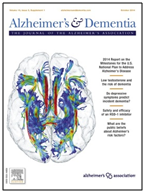 Road Map
Leadership Committee Co-Chairs Lynda Anderson of the CDC and Robert Egge of
the Alzheimer’s Association recently published an article on the Public Health Road Map in Alzheimer’s & Dementia. The article
discusses the importance of strengthening the capacity of public health
agencies, leveraging partnerships, and finding new ways to integrate cognitive
functioning into public health efforts. Since the primary readership of
Alzheimer’s & Dementia is the scientific and research community, this
article helps to bring awareness of the Road Map – and public health efforts to
address Alzheimer’s disease – to a wider audience. Road Map
Leadership Committee Co-Chairs Lynda Anderson of the CDC and Robert Egge of
the Alzheimer’s Association recently published an article on the Public Health Road Map in Alzheimer’s & Dementia. The article
discusses the importance of strengthening the capacity of public health
agencies, leveraging partnerships, and finding new ways to integrate cognitive
functioning into public health efforts. Since the primary readership of
Alzheimer’s & Dementia is the scientific and research community, this
article helps to bring awareness of the Road Map – and public health efforts to
address Alzheimer’s disease – to a wider audience.
November is National Caregiver Month
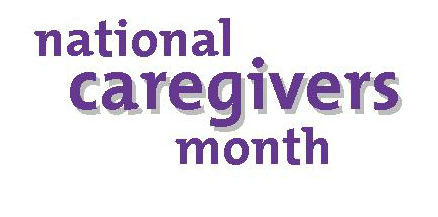 In 2013, 15.5
million caregivers provided an estimated 17.7 billion hours of
unpaid care to people with Alzheimer’s and other dementias in the United
States. Caregiving affects all facets of life for the caregiver, often having a
negative impact on their own health, financial security, and emotional
well-being. In 2013, 15.5
million caregivers provided an estimated 17.7 billion hours of
unpaid care to people with Alzheimer’s and other dementias in the United
States. Caregiving affects all facets of life for the caregiver, often having a
negative impact on their own health, financial security, and emotional
well-being.
Among caregivers for
individuals with Alzheimer’s and other dementias:
- $9.3 billion was
spent in increased health costs for caregivers themselves
- Sixty percent
rate the emotional stress of caregiving as high or very high
- Over half report
arriving late, leaving early, or taking time off from work to provide care
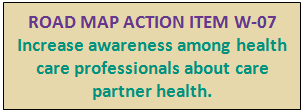 Caregiving is
increasingly being seen as an important public health issue. The public health
community can promote support for caregivers, in particular by
helping the medical community understand the unique health needs of caregivers
and the crucial role they play in the care coordination of persons with
dementia. Caregiving is
increasingly being seen as an important public health issue. The public health
community can promote support for caregivers, in particular by
helping the medical community understand the unique health needs of caregivers
and the crucial role they play in the care coordination of persons with
dementia.
New Director of Public Health joins the Alzheimer’s
Association
 With over
15 years of experience in the public health and health care fields, Molly
French recently joined the Alzheimer’s Association as Director of Public
Health. In her new role, Molly will head up the Association’s public health
efforts, including the activities of the Cooperative Agreement with the CDC
such as the BRFSS, the Public Health Road Map, and Healthy People 2020. Molly can be reached at mfrench@alz.org or
at 202.638.8674. With over
15 years of experience in the public health and health care fields, Molly
French recently joined the Alzheimer’s Association as Director of Public
Health. In her new role, Molly will head up the Association’s public health
efforts, including the activities of the Cooperative Agreement with the CDC
such as the BRFSS, the Public Health Road Map, and Healthy People 2020. Molly can be reached at mfrench@alz.org or
at 202.638.8674.
The Alzheimer’s Public Health E-News is supported by Cooperative
Agreement #5U58DP002945-05 from the Centers for Disease Control and Prevention
(CDC). Its contents are solely the responsibility of the Alzheimer’s
Association and do not necessarily represent the official views of the CDC.
|